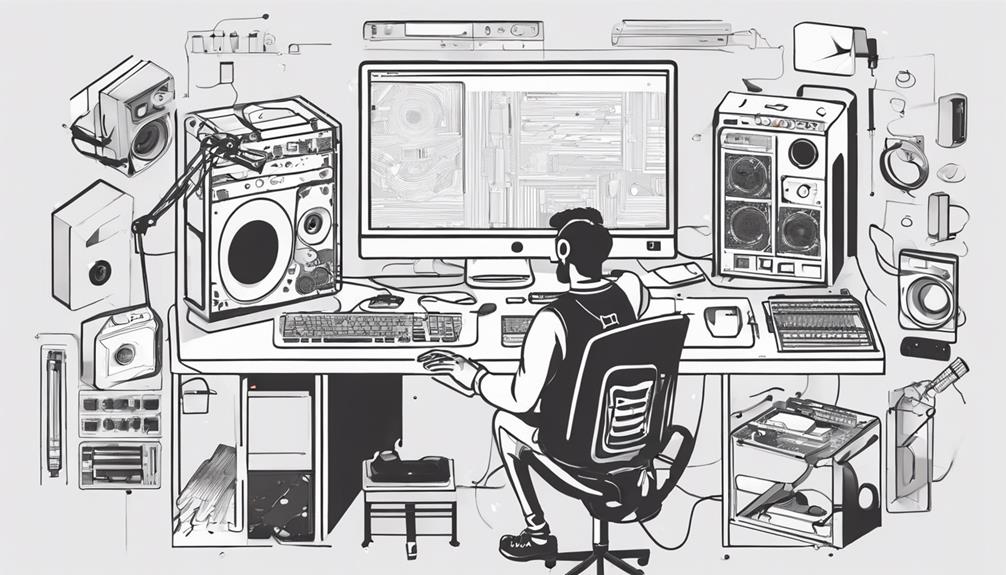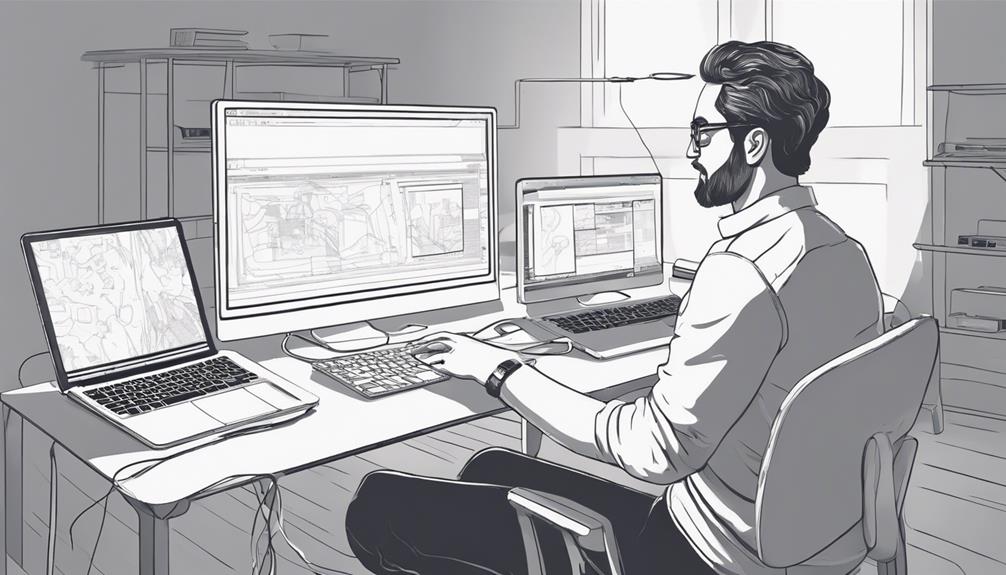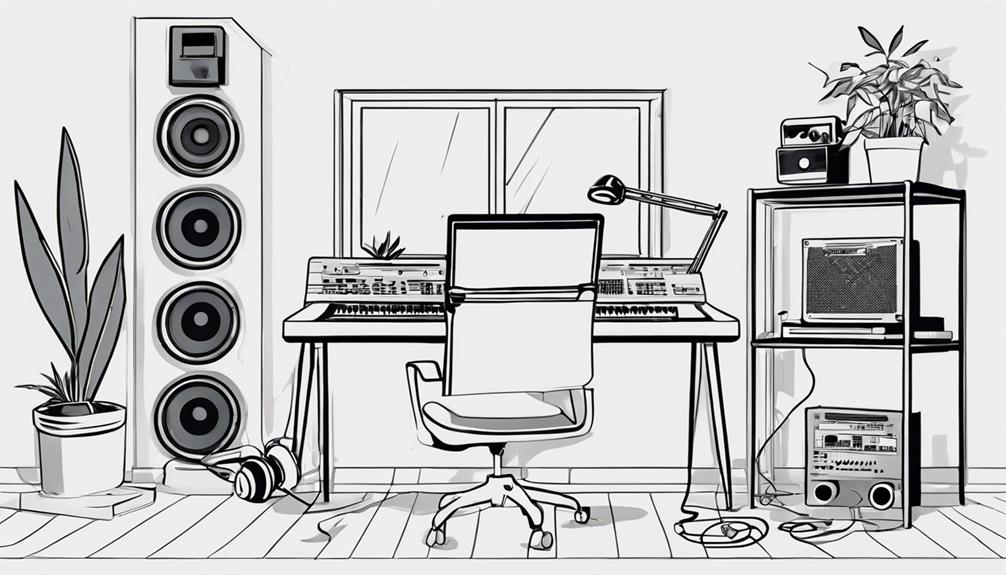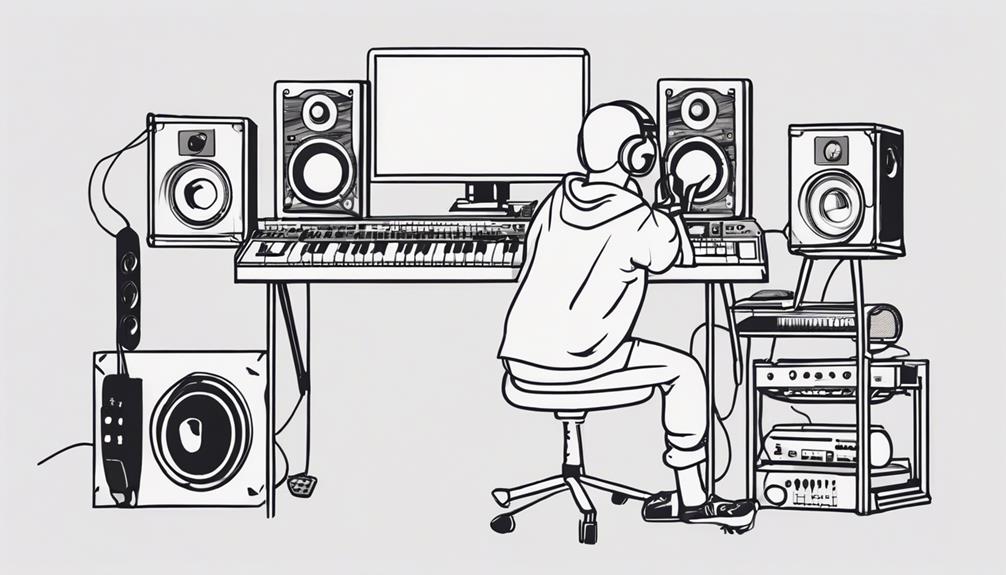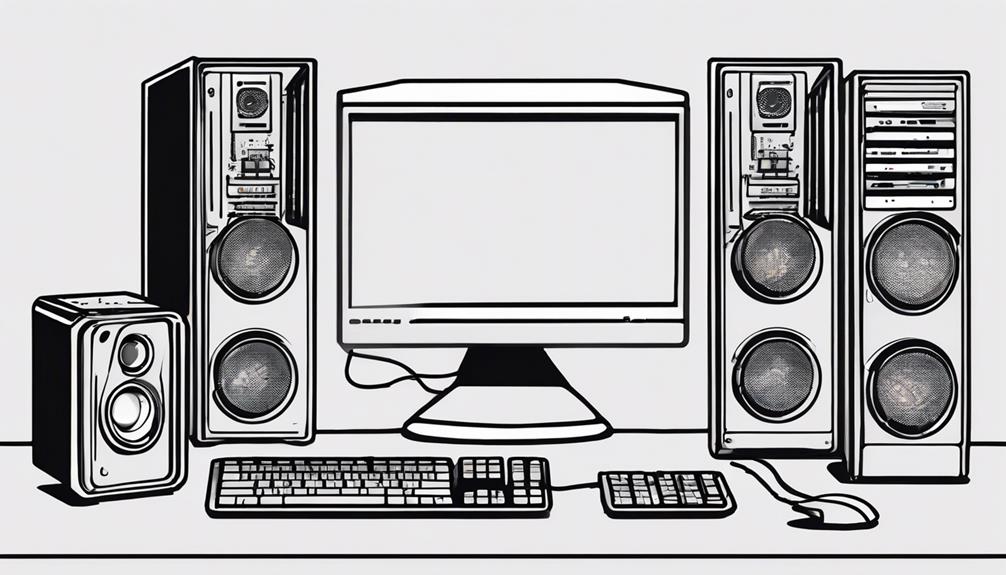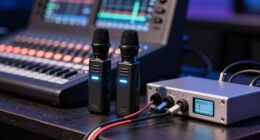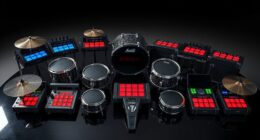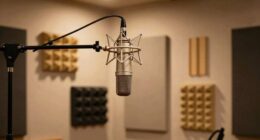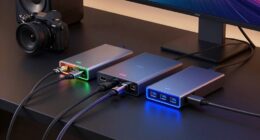Building a music production PC is achievable with the right components. Choose a PC for flexibility and upgrades or a Mac for stability. Consider CPU power like Intel Core or AMD Ryzen for seamless audio handling. Opt for 16GB DDR4 RAM and SSDs for fast performance. Pick a motherboard with room for growth, and a PSU to support components. Set up proper cooling with fans and liquid cooling for efficiency. Include sound cards, interfaces, and MIDI controllers for audio accuracy. Update software regularly for peak performance. More advice awaits on maximizing your music production PC's potential. Don’t forget to invest in high-quality studio headphones or monitors for precise sound monitoring, as they are essential tools for achieving professional-quality mixes. When you build a PC for music production, ensuring low-latency performance is crucial to avoid lag during recording and playback. Additionally, organize your digital workspace with reliable DAW software to streamline the creative process.
Key Takeaways
- Select high-core CPUs like Intel i7-14700 for efficient audio processing.
- Choose at least 16GB DDR4 RAM and fast NVMe SSDs for smooth performance.
- Opt for motherboards with ample RAM slots and PCIe lanes for upgrades.
- Implement proper cooling with fans like Cooler Master LC240E for thermal efficiency.
- Maintain regular cleaning to prevent dust accumulation and optimize PC performance.
Platform Selection
When building a music production PC, the initial crucial decision to make is which platform to choose. The choice between PC and Mac platforms for music production hinges on your preferences, workflow requirements, and software compatibility.
PCs offer an open-source environment with easy upgrade capabilities, making them a popular choice among music producers. Windows OS, a common choice for PC users, provides broad compatibility with various audio interfaces and plugins, catering to diverse needs in music production.
On the other hand, Mac systems are renowned for stability and seamless integration with hardware, attracting many music producers. Mac users often favor Logic Pro X, a well-known Digital Audio Workstation (DAW) appreciated for its user-friendly interface and features.
Ultimately, your decision on the platform will influence the operating system and components you choose for your music production PC.
Essential Components
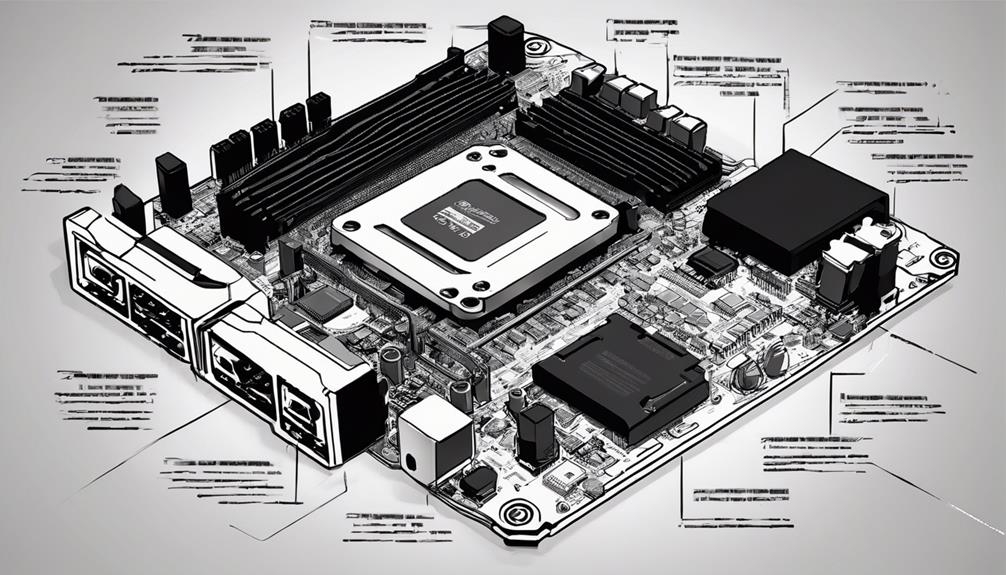
To build a music production PC that meets your audio processing needs, you must carefully select essential components. The CPU plays an important role in efficiently handling audio tasks, so opt for a powerful processor to guarantee smooth performance.
Adequate RAM is essential for managing large audio files and running multiple plugins simultaneously without experiencing lags or slowdowns. Additionally, fast and reliable storage options like SSDs are necessary for quick data access, enabling seamless operation during music production sessions.
When selecting components for your music production PC, remember that high-quality sound cards or interfaces are necessary for recording and playing back audio with minimal latency. Ensure compatibility and future-proofing by choosing a motherboard that supports all your components and offers room for upgrades as your music production needs evolve.
CPU Considerations
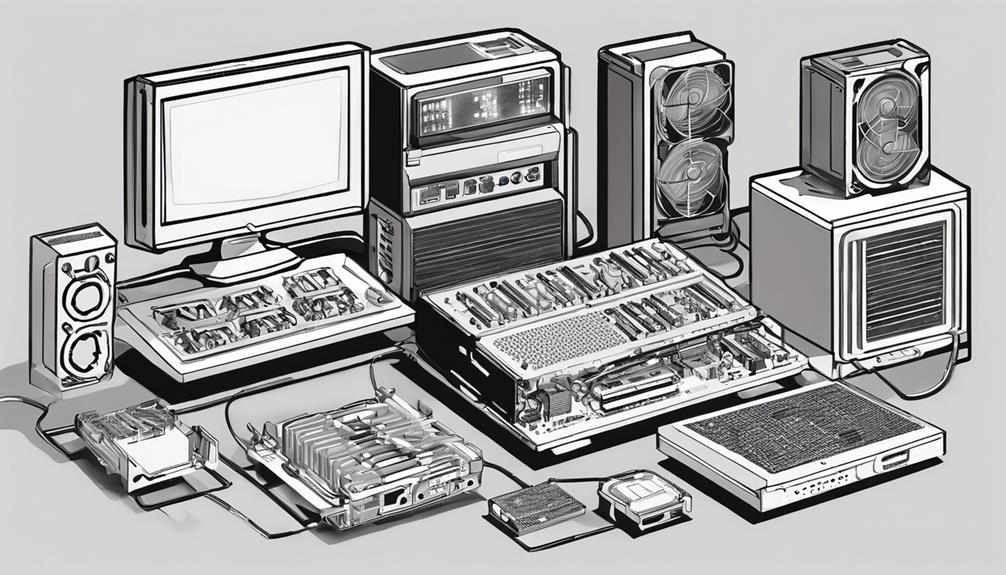
Consider selecting between Intel and AMD CPUs for your music production PC, as they're the dominant options in the market. When choosing a CPU for music production, prioritize higher core counts and faster clock speeds to efficiently manage audio processing tasks.
Recommended models like the Intel Core i7-14700 and AMD Ryzen 7 7800X3D offer excellent performance for music production needs. For those seeking top-tier performance, exploring options such as the Intel Core i9 series or the AMD Ryzen 9 series CPUs is advisable.
To guarantee your CPU operates efficiently during intensive music production sessions, investing in a quality CPU cooler is essential. A reliable CPU cooler can help maintain lower temperatures, preventing overheating and ensuring consistent performance.
For Mac users interested in music production, Apple's M series processors are a suitable alternative to explore, offering a blend of power and efficiency for your creative endeavors. When selecting your CPU, keep in mind the demands of music production to choose a processor that best fits your needs.
RAM and Storage Selection
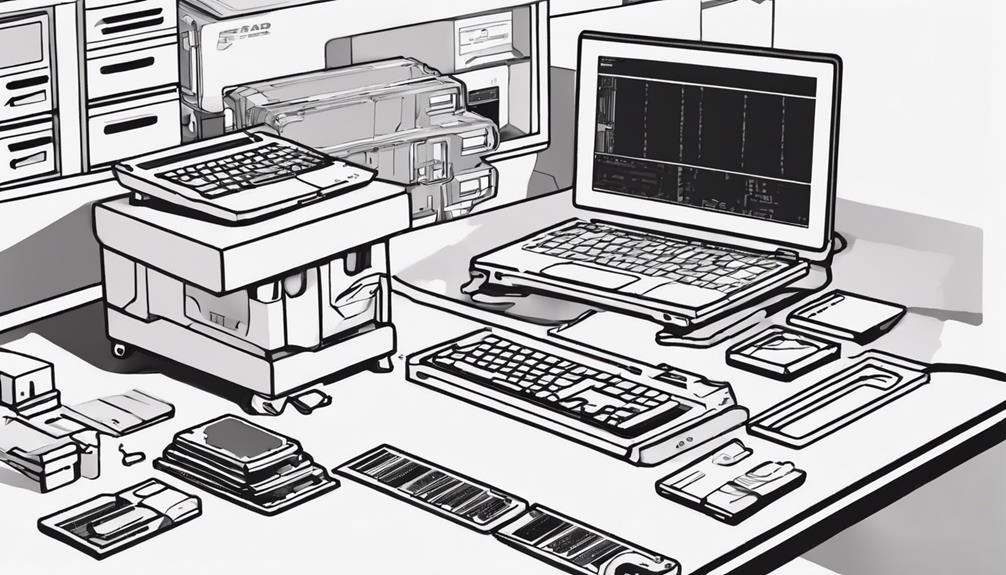
When building your music production PC, keep in mind that RAM capacity and storage type are essential factors to consider.
Aim for at least 16GB of RAM to handle multiple tracks and plugins efficiently, and opt for high-speed DDR4 or DDR5 for smooth operation during audio editing tasks.
Additionally, prioritize SSDs, especially NVMe variants, for quick access to audio files and software, ensuring a seamless workflow.
RAM Capacity
Aim for a minimum of 16GB of DDR4 RAM when building a music production PC to efficiently handle multiple tracks and plugins.
To enhance your music production experience further, consider the following:
- Upgrade to 32GB or more for larger projects and smoother performance with demanding virtual instruments.
- Opt for high-speed RAM modules such as DDR4-3200 or higher to reduce latency and improve overall system responsiveness.
- Pair your RAM capacity with fast storage options like SSDs to enjoy quicker loading times and seamless audio file manipulation.
Balancing your RAM capacity with storage options helps guarantee peak performance for music production tasks without encountering bottlenecks.
Storage Type
For peak performance in your music production PC, prioritize selecting the appropriate RAM and storage options to support your creative workflow effectively. When it comes to RAM, aim for a minimum of 16GB to ensure smooth multitasking and performance. Opt for DDR4 or DDR5 RAM with higher clock speeds for faster data processing and an overall speed boost.
Consider a combination of SSD (Solid State Drive) and HDD (Hard Disk Drive) for storage. SSDs provide fast boot times and quick program loading, while HDDs are ideal for storing large audio files and sample libraries. If you want even faster read/write speeds, opt for SSDs with NVMe interface, which outperform SATA SSDs, enabling quick access to your audio files and samples during music production. Ensure you have ample storage capacity, preferably 1TB or more, to accommodate your projects, samples, plugins, and software installations without compromising your system's speed.
| Storage Type | Description |
|---|---|
| SSDs | Fast boot times and program loading |
| HDDs | Ideal for storing large audio files and sample libraries |
| NVMe SSD | Faster read/write speeds, quick access to audio files |
Motherboard and PSU Choices
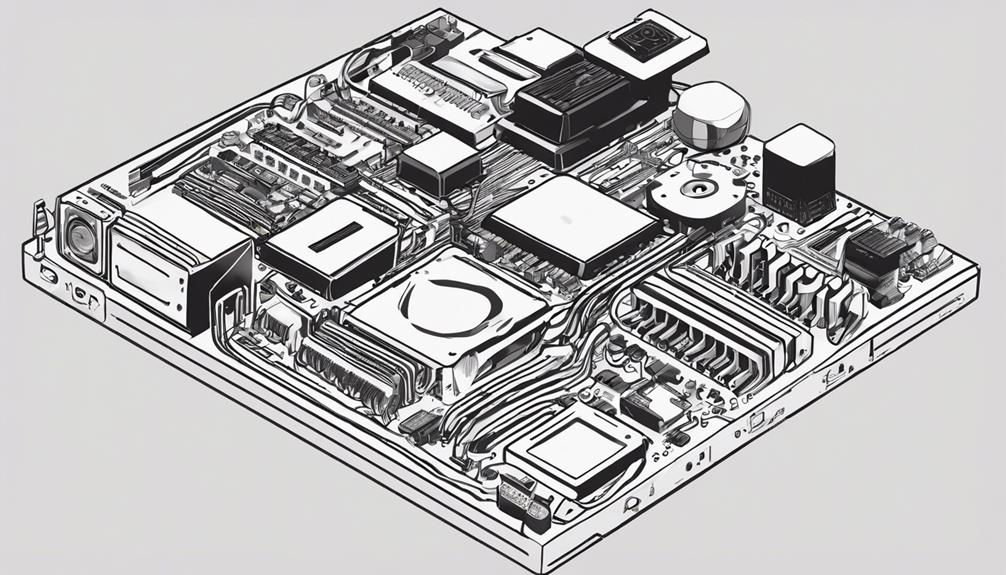
When building your music production PC, it's essential to pay attention to both your motherboard and PSU choices. Select a motherboard that offers ample RAM slots and PCIe lanes for future upgrades, while ensuring your PSU has enough wattage to power all your components effectively.
Consider opting for a modular PSU to simplify cable management in your build, enhancing airflow and reducing clutter.
Motherboard Selection Tips
Consider selecting a motherboard that aligns with common form factors like ATX or Micro-ATX as you plan your music production PC build. To guarantee a smooth setup and avoid compatibility issues, pay attention to the CPU socket and chipset compatibility with your chosen motherboard.
Additionally, look for a motherboard that provides ample room for expansion and customization by offering a sufficient number of RAM, M.2, and SATA sockets to meet your storage and memory requirements.
Opt for a minimum of 16GB of DDR5 RAM to enhance the performance of your music production tasks. Choose a motherboard that supports dual-channel memory configuration to maximize data transfer speeds and efficiency.
Select a motherboard that offers the highest clock speeds within your budget to ensure peak performance for your music production needs.
PSU Considerations
Maximize your music production PC's performance and stability by carefully considering the PSU options that align with your motherboard choices.
When building a PC optimized for music production, selecting a PSU with sufficient wattage is vital to support the components and avoid power-related issues. Opt for PSUs with higher efficiency ratings like 80 Plus Gold or Platinum to enhance energy efficiency and reduce heat output, contributing to a smoother workflow.
Modular PSUs are ideal for music production PC builds as they facilitate a cleaner cable management setup, enhancing airflow and overall aesthetics within your case. Additionally, consider the form factor and features of the PSU to ensure it meets your power requirements and can be easily accommodated in your chosen case.
Cooling System Setup
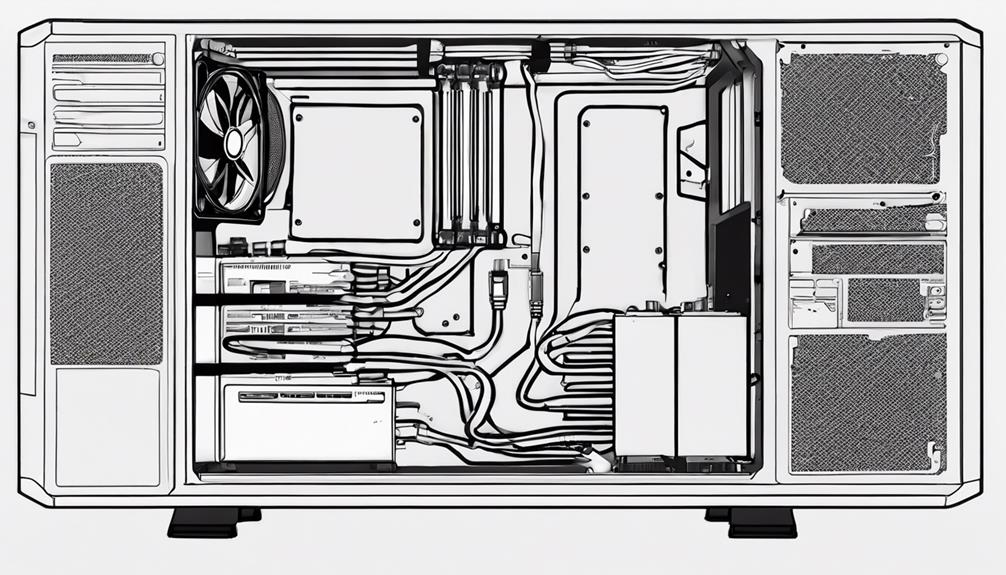
For peak performance in your music production PC, prioritize installing a high-performance cooling system like the NZXT Kraken Z73 to prevent overheating during intense sessions.
When setting up your cooling system, guarantee efficient airflow within your PC case by positioning fans and radiators strategically.
Consider opting for a liquid cooling system such as the Cooler Master LC240E for enhanced thermal performance, especially during sustained workloads common in music production.
- Proper Airflow:
Position fans and radiators correctly in your PC case to ensure superior cooling for all components.
- Liquid Cooling Benefits:
Liquid cooling systems offer superior thermal performance compared to air coolers, ideal for handling the demands of music production.
- Maintenance Matters:
Regularly clean and maintain your cooling system to prevent dust accumulation, ensuring it functions at its best capacity.
Peripheral Devices for Music Production
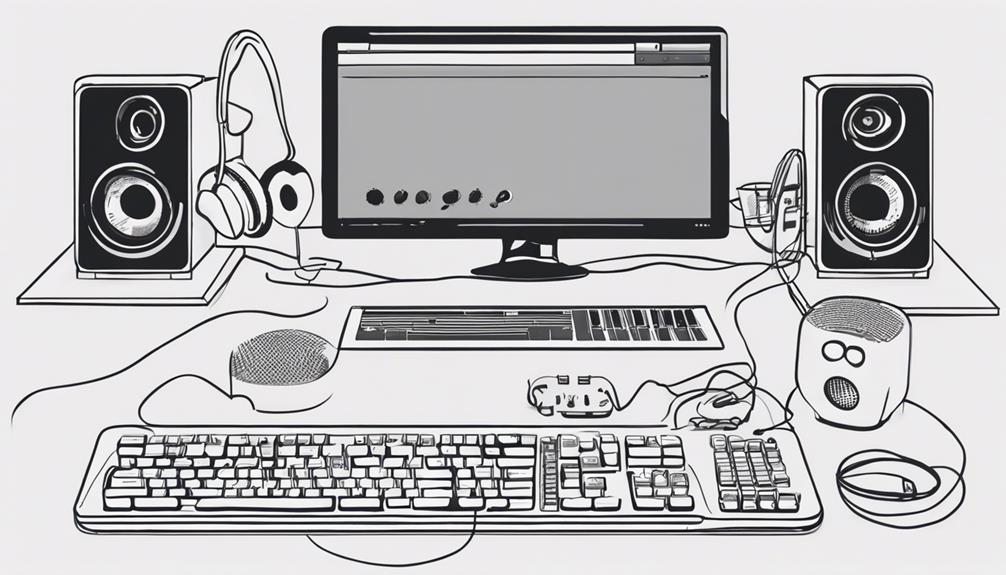
When setting up your music production PC, ensuring you have the right peripheral devices is fundamental to achieving professional audio quality and maximizing your creative potential.
Sound cards, audio interfaces, and MIDI controllers play essential roles in enhancing your music production setup. Sound cards, DAC/AMPs, and USB interfaces are necessary for high-quality audio input and output. They guarantee that the sound you hear and record is crisp and accurate.
Audio interfaces, such as external preamps, are critical for connecting microphones and instruments to your PC, enabling you to capture pristine audio recordings. MIDI controllers offer tactile control over virtual instruments and software, enhancing your workflow efficiency and creativity.
Additionally, quality headphones, speakers, and external gear are indispensable for accurate sound reproduction and monitoring during music production. By selecting the right peripherals that complement your setup, you can achieve professional results and elevate your music production to the next level.
Software Installation and Maintenance
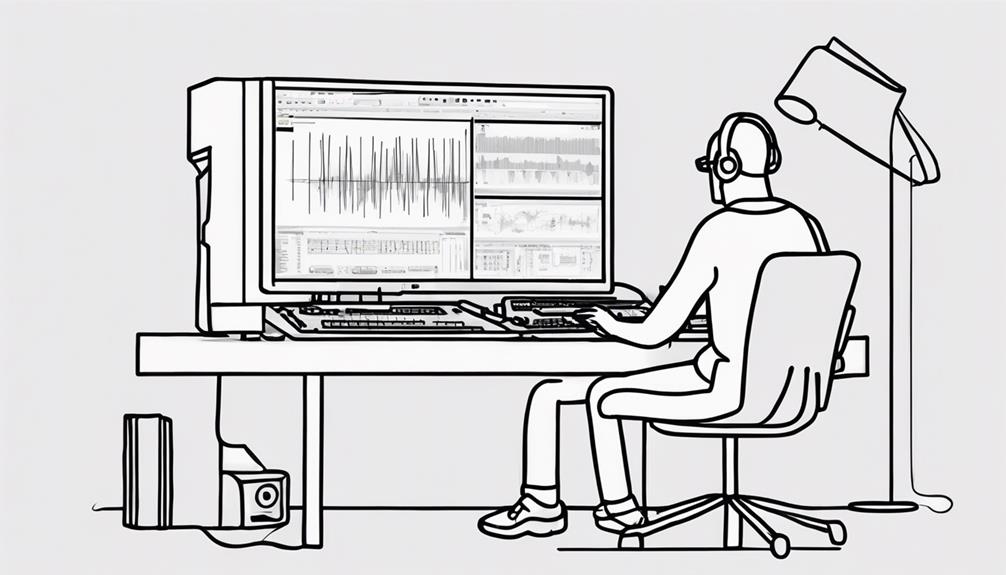
To guarantee peak functionality and creativity on your music production PC, start by installing your preferred Digital Audio Workstation (DAW) software.
Once your DAW is set up, enhance your music production capabilities by installing necessary plugins and virtual instruments. These additions will provide you with a wide array of sounds and effects to experiment with, boosting your creative workflow.
Next, ensure peak performance by setting up your audio interface and installing the required drivers. Updating your software, including the operating system, DAW, plugins, and drivers, regularly is essential to access the latest features and improvements for a seamless music production experience.
Additionally, configuring MIDI controllers and external gear in your DAW will enable you to integrate hardware instruments effortlessly, expanding your sonic possibilities.
Stay diligent with software maintenance to keep your music production PC running smoothly and efficiently.
Frequently Asked Questions
What PC Specs Do You Need for Music Production?
You need a powerful CPU like Intel i7 or AMD Ryzen 7 for quick audio processing. Get at least 16GB DDR4 or DDR5 RAM for efficient handling of large projects. Choose SSD storage with 1TB capacity and consider a dedicated sound card for high-quality audio.
How to Configure PC for Music Production?
Enhance the rhythm of your creativity – set up your PC for music production! Optimize audio settings, connect your interface seamlessly, and integrate MIDI gear effortlessly. Update software regularly and upgrade components for high-quality performance.
What PC Do Music Producers Use?
Music producers often choose custom-built PCs with CPUs like Intel Core i7 or i9, AMD Ryzen 7 or 9, and Apple's M series processors. Choose a minimum of 16GB of DDR5 RAM and SSD storage for peak performance in music production.
How Many GHZ Is Needed for Music Production?
Get grooving with a CPU clock speed of 3.5 GHz or higher for music production. Boost your beats with turbo tech for peak performance. Multiple cores over high GHz rule the rhythm in audio tasks.
Conclusion
Now that you have all the essential components and peripherals for your music production PC, it's time to bring it all together and start creating some amazing tunes.
But wait, there's one final step you can't forget…
Stay tuned for the next article where we explore the world of software installation and maintenance to guarantee your music production PC is running smoothly and efficiently.
Get ready to take your music production skills to the next level!

